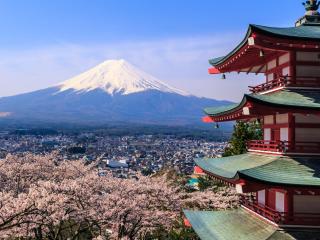Studying in Japan
| Date: | 11 November 2015 |
| Author: | Roy de Vries |

Around 9:30 pm we were ready to go. It was a hot Japanese summer day, somewhere in July, though I was wearing my winter coat, two pair of socks and a warm hat. All of this had to do with the fact that by that time we had been some 2.200 meters above the ground. It was already quite cold, but we knew that we would be reaching the 3.776 meters in a couple of hours, in the midst of the night. Indeed, we were about to climb Mount Fuji, Japan's highest and most well-known mountain.
The experience of climbing Mount Fuji represented a lot of my time in Japan, as well as the Japanese culture. Although we climbed the historical mountain in the night, we were definitely not alone: hundreds of people had the same idea, to watch the astounding sunrise from the summit. Japan's mass culture was seen in a nutshell, by walking up the mountain. Perfectly in order, the Japanese climbed up rather silently and in a straight line. A substantial part of the path was wide enough for multiple people to walk side by side. However, since this would muddle the harmonic order, everybody walked in single file. My individualistic nature caused me to often overtake the Japanese (and quite some other foreigners did as well), because I craved for that hot ramen soup on the summit.
Now this was one of the interesting features of my time studying in Japan: Western individualism versus Japan's collectivism. A group culture truly is embedded in Japan's society, though of course modernization and capitalism bring about counter forces. Nevertheless, the will and wishes of the Japanese individual are inferior to the collective. This results not only in walking in single file up Mount Fuji, but also in a great deal of working overtime, obliged drinking after work with your boss and not showing your emotions during the day. While these may be rather negative features of collective culture, it also produces amazing and heartwarming elements: the Japanese will do anything for you and for each other. If you ask someone for the way, big chances are that they will literally walk you to your desired destination, even if this screws up their own plans.
Back to the mountain. Along the way to the summit, there are 10 stations where you can take a rest, eat and drink. Now this mountain is a true mountain, with nothing but stone and sheer nothingness. But in Japan everything is regulated extremely well. Contrary to the Netherlands, the trains are always on time. And when I say always, I mean always. In fact, when there ís a delay, even if this is 1 or 2 minutes, the intercom will sound through the train station with apologies. Travelling is thus really easy in Japan. Moreover, the Japanese want to know everything for their administration, leaving no room for mistakes or misknowledge. This makes the country highly bureaucratic, and one should expect filling in lots of documents when coming to Japan. For me, it felt safe and taken care off.
Around 4 am we arrived on the summit of Mount Fuji. The hot ramen soup that I had craved for during the climbing, was even better than in my imagination. But actually all the food was. I cannot remember one single dish that did not taste well. The Japanese culture is an eat-culture, and you can find lots of restaurants, in all kinds of sizes, in nearly every street. Precision and diligence are in the tradition of Japanese cooking, making the Japanese cuisine irresistible. For me this represents the assiduous nature of the nation: founded in historical experience, they do their utmost best to satisfy their customers. Again, I felt taken care off.
A half hour later, at 4:30 am, the sun rose, slowly lighting up the country that we could see from nearly 4 kilometers high. It was an astounding scenery, with clouds breaking into mountains, enormous lakes reduced to small ponds and the horizon filling up with the color orange. Japan honestly is a very beautiful country, with over 80 percent mountains, mostly covered in trees of all sorts of green colors. Hiking, cycling, train and road trips will take you the most fascinating places of Japan. While the cities may at first sight appear to be rather gray, some buildings and parks are made with fine architecture. Like other cities in the world perhaps, it's like walking in a jungle of different buildings. The abundant neon lights in Japan, however, makes it a rather unique experience. On that top of the summit I was happy, and luckily that feeling also represented my time in the country of the rising sun.

